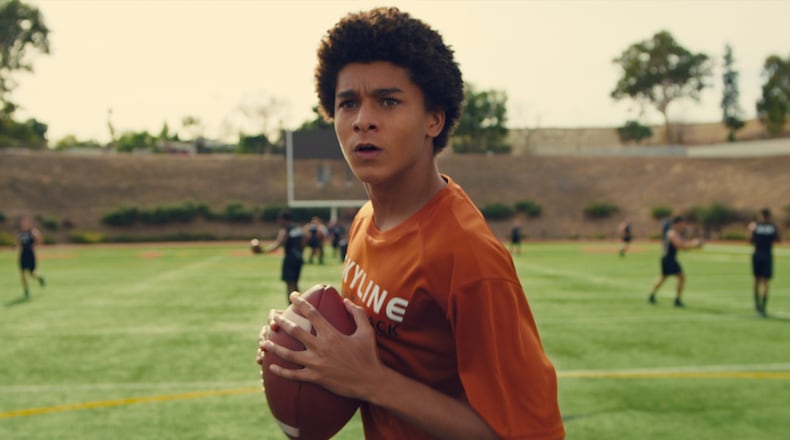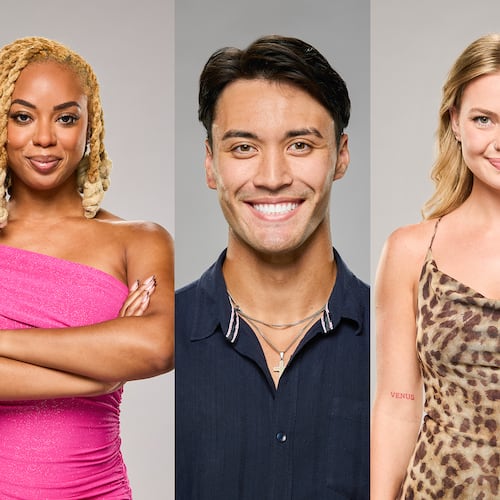During a traffic stop in the third episode of the recently released limited Netflix series “Colin in Black and White,” a teenage Colin Kaepernick played by Jaden Michael is driving a car and is caught speeding.
The tense encounter with the cop ends only when the cop finds out Kaepernick’s an adopted Black kid with well-meaning white parents who are fortunately also in the car as passengers. He lets Kaepernick off with a warning.
While Kaepernick is left shaken and breathing heavily, his mom, played by Mary Louise Parker, says brightly, “You dodged a bullet!”
His dad (Nick Offerman) smiles and adds, “You just beat your first ticket.”
The series, produced by Ava DuVernay (”Queen Sugar”) and former NFL player and current social activist Kaepernick, isn’t exactly subtle about the indignities big and small the future NFL quarterback faced growing up in a tiny, mostly white California town.
Kaepernick, now 34, as an adult became a pariah in football after choosing to kneel during the National Anthem to protest racial inequality and police brutality. The issue is referenced only briefly in the series but is clearly the impetus for its very existence.
“I even have some friends and people I consider family friends who don’t agree with Colin but found [the series] really inspirational and enlightening,” said Michael, 18, promoting the series recently at the Four Seasons in Midtown Atlanta. “They may not agree with his political ideology but they can respect him as a person.”
Michael thinks Kaepernick is misunderstood, painted in ways that don’t reflect reality. And he has been a fan of Kaepernick’s even prior to being cast to play him. “I think it’s important if you have any influence upon society or your community, you should use it for positive change,” Michael said. “The fact Colin would do it so selflessly and put his entire career on the line was incredible to me. I look up to him.”
When Michael was cast, he didn’t think he could play Kaepernick because he didn’t think his background growing up in New York City had anything to do with Kaepernick’s childhood in the 1990s and 2000s with white adoptive parents.
“Seeing his childhood and how he was raised, I realized he was human and just like many of my brothers and sisters in Harlem and around the world,” Michael said.
The series isn’t just an autobiographical recitation of Kaepernick’s formative years. The series is also a history lesson of sorts, with the actual Kaepernick as host and commentator. Often, he is seen watching his younger self and providing contextual background on words and phrases like “thug,” “acceptable Negro” and “microaggression.”
Occasionally, the series will show mini-plays of Black folks getting rejected for loans or being vaguely insulted by a white boss.
“It’s a beautiful coalition of ideas and a collage of film mediums and it’s a beautiful experience to learn and educate yourself through,” Michael said. (He has not actually watched the series because he hates watching himself but he’s aware of what they did having read the script.)
Michael said the toughest episode for him was episode five when he woos a girl, played by Klarke Pipkin. “I never did any romance before in real life or in film,” he noted. “Klarke and I worked closely to create an authentic feeling on screen and the director [Angel Kristi Williams] did a fantastic job providing a safe space to find the characters.”
The final episode, where Kaepernick actively seeks a college football scholarship over plenty of baseball opportunities is directed by Tony-winning Atlanta playwright and producer Kenny Leon.
“He is a mastermind,” Michael said. “Every time I talk to him, I feel like I’m embraced by genius. I remember at first he doubted me. And then I refused to be put down by him. I kept pushing for his approval and his motivation. Toward the end, I gained a little bit of his respect. He’s been one of the most enlightening directors to work with.”
Michael did not compete in high school in any of the three sports shown in series: basketball, baseball and football. He needed a lot of coaching and said it was a major challenge to look like he knew what he was doing in two months.
“I grew up skateboarding in New York City,” he said. “I knew how to control my body. I feel like acting is also sort of physical in nature. You have to understand your body and body language. It was correlated so I had a little preparation. But it’s completely different learning the dedication required with team sports.”
Credit: Netflix
Credit: Netflix
Michael said the scene where Kaepernick was pulled over by the cop was not easy. He had to absorb Kaepernick’s naiveté at that time concerning the power dynamics between a cop and a Black teen.
As a Black teen, he had already been taught how act in front of a cop in those situations but had “to throw them out of the window” so he could live inside Kaepernick’s young brain.
“I moved quickly,” he said. “I was a little rude to the officer at times. Things you’re told not to do.”
While his own experiences with police enforcement haven’t been headline worthy, his mom had a male Black friend who was beaten by cops while getting Chinese food and justice was never served. “He was left with those scars mentally and physically,” Michael said. “The story helped me encapsulate the feelings that Colin was misunderstanding at the moment.”
What Michael himself has learned from Duvernay is one of the final comments made in the series: “Trust your power.”
“She had allowed me to trust my Blackness, the side of me I hadn’t completely understood,” he said. “My mom’s Latin. I wasn’t really raised by the Black side of my family. Ava really commands attention. She commands respect. She has that confidence I aspire to have in the future.”
WHERE TO WATCH
“Colin in Black and White,” available on Netflix
About the Author
Keep Reading
The Latest
Featured




